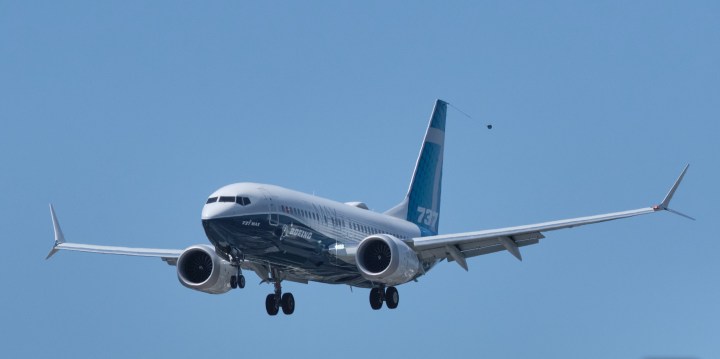THE CONVERSATION
Should you be concerned about flying on Boeing planes?

The American aerospace company Boeing has been synonymous with safe air travel for decades, but recent weeks have seen it plagued by a series of issues.
Since the 1990s, Boeing and its European competitor Airbus have dominated the market for large passenger jets. But this year, Boeing has been in the news for all the wrong reasons. In January, an emergency door plug blew off a Boeing 737 MAX in mid-flight, triggering an investigation from United States federal regulators.
More recently, we have seen a Boeing plane lose a tyre while taking off, another flight turned back as the plane was leaking fluid, an apparent engine fire, a landing gear collapse, a stuck rudder pedal, and a plane “dropping” in flight and injuring dozens of passengers. A Boeing engineer who had raised concerns regarding quality control during the manufacturing process on the company’s 787 and 737 MAX planes also died, apparently of a self-inflicted gunshot wound.
As members of the travelling public, should we be concerned? Well, yes and no.
Many problems, but not all can be blamed on Boeing
The recent parade of events has certainly been dramatic – but not all of them can be blamed on Boeing. Five incidents occurred on aircraft owned and operated by United Airlines and were related to factors outside the manufacturer’s control, like maintenance issues, potential foreign object debris, and possible human error.
A United Airlines 777 flying from San Francisco to Japan lost a tyre on takeoff, a maintenance issue not related to Boeing. The aircraft landed safely in Los Angeles.
They’re called Boeing because that’s the sound their wheels make when they fall off the plane
— 7/11 Truther (@DaveMcNamee3000) March 12, 2024
A United Airlines flight from Sydney to Los Angeles had to return to Sydney due to a “maintenance issue” after a fluid was seen leaking from the aircraft on departure.
A United Airlines 737-900 flying from Texas to Florida ended up with some plastic bubble wrap in the engine, causing a suspected compressor stall. This is a disruption of air flow to an operating engine, making it “backfire” and emit flames.
A United Airlines 737 Max flying from Tennessee to Texas suffered a gear collapse after a normal landing. The pilot continued to the end of the runway before exiting onto a taxiway – possibly at too high a speed – and the aircraft ended up in the grass and the left main landing gear collapsed.
The fifth event occurred on a United Airlines 737-8 flight from the Bahamas to New Jersey. The pilots reported that the rudder pedals, which control the left and right movement of the aircraft in flight, were stuck in the neutral position during landing.
Manufacturing quality concerns
The exit door plug failure in January occurred on an Alaska Airlines flight. US regulators are currently investigating Boeing’s manufacturing quality assurance as a result.
The door plug was installed by a Boeing subcontractor called Spirit AeroSystem. The door plug bolts were not properly secured and the plug door fell off in flight. The same aircraft had a series of pressurisation alarms on two previous flights, and was scheduled for a maintenance inspection at the completion of the flight.
Spirit got its start after Boeing shut down its own manufacturing operations in Kansas and Oklahoma, and Boeing is now in the process of buying the company to improve quality oversight. Spirit currently works with Airbus, as well, though that may change.
What changed at Boeing
Critics say the culture at Boeing has changed since Airbus became a major competitor in the early 2000s. The company has been accused of shifting its focus to profit at the expense of quality engineering.
Former staff have raised concerns over tight production schedules, which increased the pressure on employees to finish the aircraft. This caused many engineers to question the process, and the US Federal Aviation Administration (FAA) to fine Boeing for lapses in quality oversight after tools and debris were found on aircraft being inspected.
Several employees have testified before US Congress on the production issues regarding quality control. Based on the congressional findings, the FAA began to inspect Boeing’s processes more closely.
Several Boeing employees noted there was a high staff turnover rate during the Covid-19 pandemic. This is not unique to Boeing, as all manufacturing processes and airline maintenance facilities around the globe were also hit with high turnover. As a result, there is an acute shortage of qualified maintenance engineers, as well as pilots. These shortages have created several issues with the airline industry successfully returning to the pre-pandemic levels of 2019. Airlines and maintenance training centres around the globe are working hard to train replacements, but this takes time as one cannot become a qualified engineer or airline pilot overnight.
So, is it still safe to fly on Boeing planes? Yes it is. Despite dramatic incidents in the news and social media posts poking fun at the company, air travel is still extremely safe, and that includes Boeing.
We can expect these issues with Boeing planes now should be corrected. The financial impact has been significant – so even a profit-driven company will demand change. DM
This story was first published in The Conversation. Doug Drury is a Professor and Head of Aviation at CQUniversity Australia.




















 Become an Insider
Become an Insider
Seems a bit weird that this guy gives Boeing the thumbs-up without really offering anything beyond ‘Planes are safe!’
No mention of the 737 Max issue where let’s face it, Boeing murdered 346 people for profit because making sure their planes were safe was just an unnecessary cost that they didn’t want to bear. Or maybe they could have considered getting the airlines to retrain pilots on the software? Nah – also too expensive.
The point being, they may be scrambling to make changes now, but what of the planes that have come off the production line in the last few years. The Alaska Airlines Max 9 was brought into service last October.
How does Mr Drury come by his cheery Boeing prognosis? He doesn’t really say.
“We can expect these issues with Boeing planes now should be corrected”. Professor (?), it would have been reasonable to have expected Boeing to correct the 737MAX design and production issues after two of these aircraft atomised 346 passengers and crew in awful circumstances in 2018/19. And yet 5 years later, thanks to a huge bit of luck (Alaska 1282 was climbing, passing FL140 and not cruising at FL300, when the plug blew off), it’s the same old Boeing, promising to get it right. The MAX never will be right as it was founded on short cut cheap design solutions to tummy-tickle launch customers, particularly Southwest. You also write, “The door plug bolts were not properly secured and the plug door fell off in flight”. The door plug bolts were NOT installed period, having been removed (that removal having been undocumented as it should have been) during a production line repair to damaged rivets in the area of the plug. DM, please sharpen editorial standards on aviation related stories.
I will not fly Boeing 737 Max Planes and will book with another airline.
He doesn’t substantiate his conclusion properly at all. Watch Juan Brown’s channel on Youtube – he’s a Boeing 777 pilot and has done several videos on the latest Boeing incidents. Until the corporate culture at Boeing is re-set to focus on safety and manufacturing excellence, I would not get on a 737 Max. Maybe an older 737 and a 777, which is by all accounts an excellent aircraft